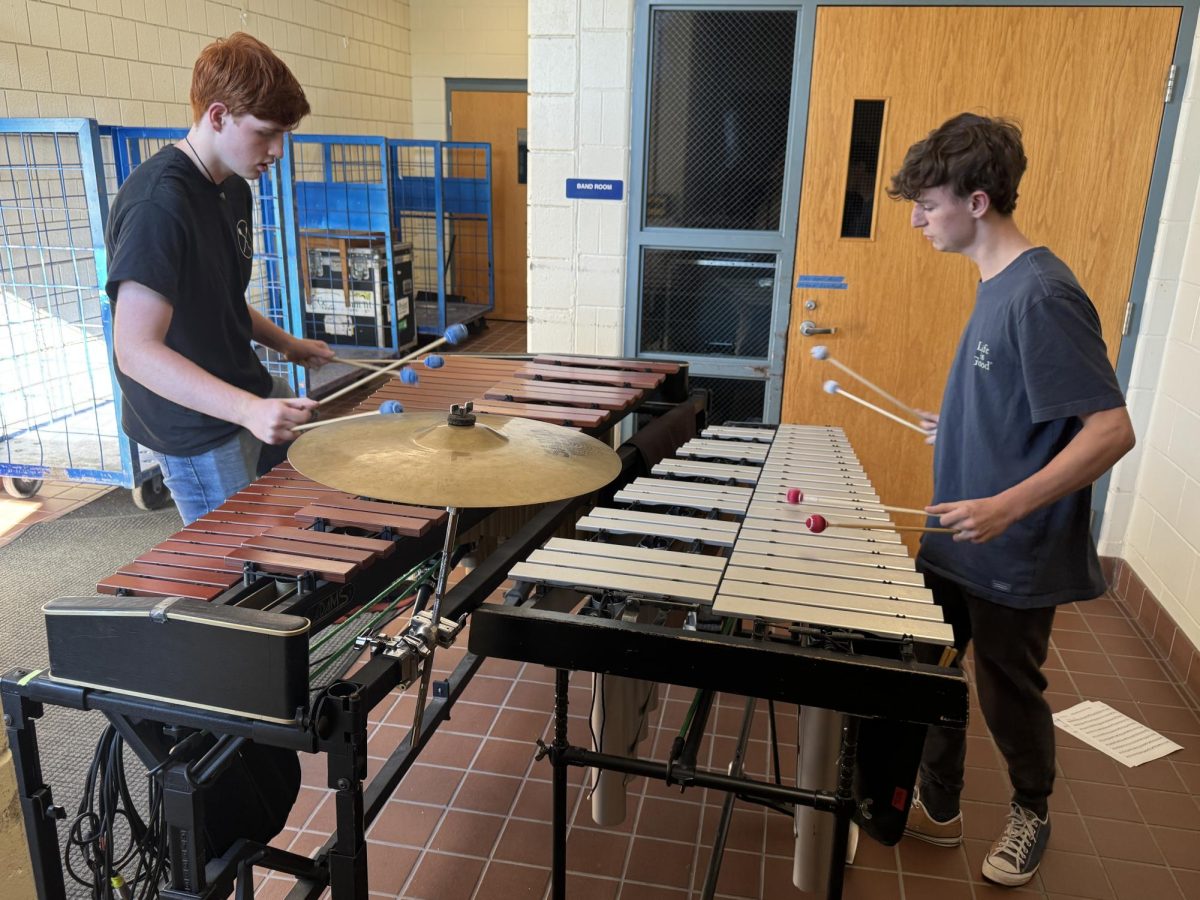
As the semester draws to a close, the craziness of midterms begins.
The exams that every junior and underclassman has to take is worth twenty percent of a student’s overall grade, which means that the exam can lower the semester average by an entire letter grade.
If a student has a B in a class, a bad midterm can drop it to a C.
Not only is this system unfair to the students who work hard all year and maintain good grades, but it does not accurately represent what the students are going to experience outside of high school.
I move to get rid of midterms and finals all together because there are so few benefits and too many drawbacks for students.
Even if the student has worked hard all semester, studied for tests, and has an A in the class, they still have to take the exam.
After a solid week of the stress of studying and of timed tests, students’ brains are not prepared to take that last test and therefore their grades suffer. This does not mean the student is lazy and didn’t study. Rather what it means is that their performance on the test is not an accurate representation of the work the student has done all year.
At least part of the reasoning behind requiring students to take midterms and finals is the belief that taking these two-hour tests will prepare them for college.
This, while it sounds nice, doesn’t really make sense.
The fact of the matter is high school is not college and high school exams are not college exams. College exams are typically set up very differently than having 6-8 exams crammed into four days. And besides, not every college class requires you to take a final anyway.
And besides, college is not always the destination of students after high school, and taking a long exam is not necessarily going to prepare these students for life in the workforce.
Another reason to get rid of exams is simply because a full week is wasted during each semester for finals. During that week, students could be learning a lot more by being in their classes instead of being evaluated for what they already learned and leaving at 11:30.
This also means that teachers feel the need to pack in any content or projects or tests the week before finals, so students end up learning new content the week before finals. And worse, students end up taking two full weeks of tests. Because of this rushed timeline, teachers are also not able to take time and fully explain many things, leading to students having a lesser understanding of the information that is going to be on the final exam, which is, again, is worth 20% of their semester grade.
Also if there are snow days, teachers who teach classes that only last a semester often don’t get to cover all the material they want. Or if they do add days to the semester because of snow days, then a new semester class could start on a Wednesday, which is difficult and stressful for both teachers and students.
Sure, exams can be a valuable tool for measuring how well a student has mastered a concept. However, teachers give exams all semester long, which are more accurate in reflecting a student’s knowledge than a final exam.
Grades accumulated throughout the semester are also more indicative of how well a student can study, organize time, persevere and complete a challenge.
I understand that sometimes grades are watered down by homework and participation and are sometimes not a true representation of how well a student knows the material. However, it is up to the teacher to make their grading system fair and accurate.
Students are already required to take competencies, which are supposed to prove that they have mastered the important skills in each class. Why are we testing them again?
An argument can be made that in core classes—where it is critical for a student to have mastered concepts before moving on—that perhaps midterms and finals have value. It might seem to make sense for classes like math, science, English or social studies to have a midterm and final.
However, in reality, to only have certain classes require a midterm and final would not work. It would mean that some teachers have to grade final exams and others would not. Plus, what really is a core class? A class like accounting or engineering would also require students to have mastered material before learning new concepts, but both are considered electives by the school.
Perhaps the solution to this problem is to extend the rule that an A in a class exempts all students from taking the exam, not just seniors. This plan—the same plan Pinkerton has in place—might encourage students to work hard all year so they would not have to take the exam. But this would not solve the problem of midterms being an interruption to classroom time and final exams still don’t accurately show what a student knows or is capable of.
The best solution then? Get rid of midterms and finals all together.
I promise. No one will miss them.















Barbara Mee
Jan 15, 2016 at 2:45 pm
Well, if we give mid-terms, it’s a surprise to me. I don’t know of another high school who does finals and credits the way we do. If these were truly mid-terms, then you couldn’t get a 1/2 credit, and June exams would cover the beginning of school until the end. AND…show me how many colleges, etc. don’t have testing? Or mid-terms or finals?
Emily Georgakopoulos
Jan 15, 2016 at 2:35 pm
Midterms and finals are a mini representation of what college is going to be like, and the final goal for most students coming out of high school is college. The education system is trying to prepare you for the five or more two hour exams that you are going to have to take in a one week time span in college. I agree that the testing system is not fair and that these tests don’t accurately test one’s knowledge, but in order to effectively change all that you have to start from the top. Should colleges and universities get rid of midterms and finals as well? That would reduce tons of stress but is it effective? Maybe it shouldn’t account for so much of one’s grade but maybe that wouldn’t encourage students to study as hard. In college you don’t have tests and exams throughout the year so this one exam in the middle and end test what you should have been studying all along. So yeah, they seem pointless in high school, but high school is really just preparing you for the skills you need to take a test of this magnitude. It’s annoying, but it helps. No one would miss the exams, but come test time in college you will encounter much more anxiety had you experienced them in high school.
Hayliee Nee
Jan 15, 2016 at 1:34 pm
I personally think that if you get an A for both quarters regardless of your grade you shouldn’t have to take the final. I think that this would reward the students that work hard all year and provide an incentive for students to work harder all year.
Kris Haken
Jan 15, 2016 at 12:20 pm
I dont know, I mean I personally love midterm weeks. Its a good test of what you’ve learned all semester, it gives you a chance to bring up your semester grade AND we get out of school earlier. I see no reason to get rid of it because I guess i just dont really stress about tests. Plus it helps prepare us for college because in college there are finals and big tests that can be worth a good chunk of the final grade, similar to midterms. The one thing I do think we should change is that I think for any grade level (not just seniors) that If you have an A (no A-) for both quarters, theres no real reason for you to take the midterm, so i think they should be able to opt out of it. And I also think that as long as you dont have another midterm to go to, that when you finish your midterm you should be able to leave the room, because everyone works at their own pace, and I mean if that person doesnt want to take it seriously and just spend like two minutes on it, then that hurts them. But as far as those who actually complete a test in like an hour and a half, they should be able to leave.